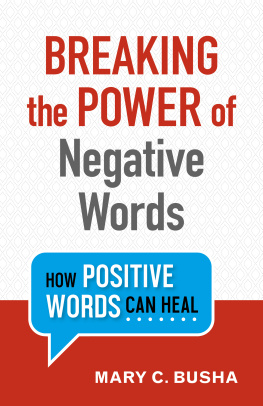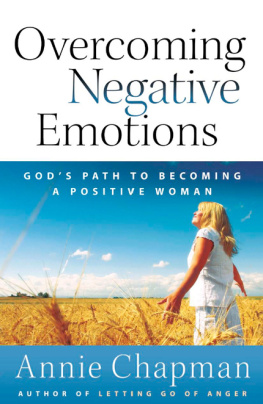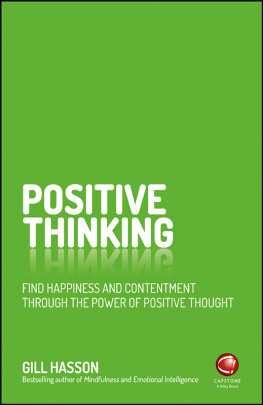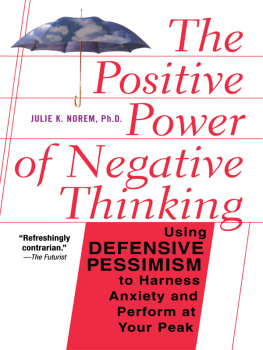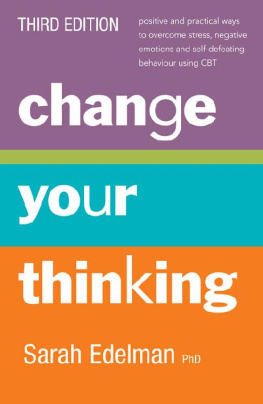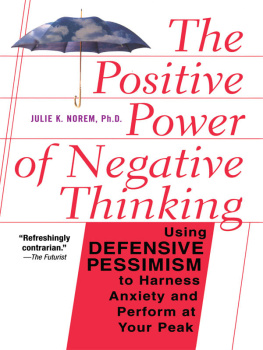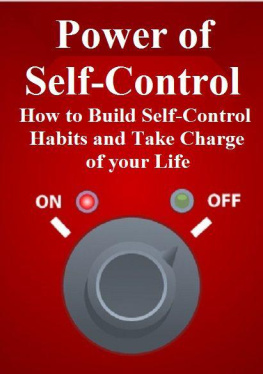Dr Tim Lomas - The Positive Power of Negative Emotions
Here you can read online Dr Tim Lomas - The Positive Power of Negative Emotions full text of the book (entire story) in english for free. Download pdf and epub, get meaning, cover and reviews about this ebook. year: 2016, publisher: Little, Brown Book Group, genre: Religion. Description of the work, (preface) as well as reviews are available. Best literature library LitArk.com created for fans of good reading and offers a wide selection of genres:
Romance novel
Science fiction
Adventure
Detective
Science
History
Home and family
Prose
Art
Politics
Computer
Non-fiction
Religion
Business
Children
Humor
Choose a favorite category and find really read worthwhile books. Enjoy immersion in the world of imagination, feel the emotions of the characters or learn something new for yourself, make an fascinating discovery.

- Book:The Positive Power of Negative Emotions
- Author:
- Publisher:Little, Brown Book Group
- Genre:
- Year:2016
- Rating:5 / 5
- Favourites:Add to favourites
- Your mark:
- 100
- 1
- 2
- 3
- 4
- 5
The Positive Power of Negative Emotions: summary, description and annotation
We offer to read an annotation, description, summary or preface (depends on what the author of the book "The Positive Power of Negative Emotions" wrote himself). If you haven't found the necessary information about the book — write in the comments, we will try to find it.
The Positive Power of Negative Emotions — read online for free the complete book (whole text) full work
Below is the text of the book, divided by pages. System saving the place of the last page read, allows you to conveniently read the book "The Positive Power of Negative Emotions" online for free, without having to search again every time where you left off. Put a bookmark, and you can go to the page where you finished reading at any time.
Font size:
Interval:
Bookmark:
Published by Piatkus
ISBN: 978-0-349-41285-6
Copyright 2016 Tim Lomas
The moral right of the author has been asserted.
All rights reserved. No part of this publication may be reproduced, stored in a retrieval system, or transmitted, in any form or by any means, without the prior permission in writing of the publisher.
The publisher is not responsible for websites (or their content) that are not owned by the publisher.
Piatkus
Little, Brown Book Group
Carmelite House
50 Victoria Embankment
London EC4Y 0DZ
www.littlebrown.co.uk
www.hachette.co.uk
Tim Lomas was born in London in 1979, and attended Acton High School then Richmond upon Thames College. Before starting university, he went to China for six months to teach English, where he became interested in Buddhism. Between 1998 and 2002 he completed an MA (Hons) in Psychology at Edinburgh University, where he also founded a ska-rock band called Big Hand. He spent the next six years recording and touring with the band, while also working part-time as a nursing assistant in a psychiatric hospital.
In 2008, Tim was awarded a scholarship by the University of Westminster to undertake a PhD focusing on the impact of meditation on mental health. His PhD research formed the basis for a subsequent book, published by Palgrave Macmillan, entitled Masculinity, Meditation and Mental Health. He then worked as an associate lecturer at the University of Chichester, and a research assistant at the University of Warwick, before obtaining a permanent lectureship in positive psychology at the University of East London in 2013. Tim has written numerous academic books and papers, mainly focusing on meditation and Buddhism.
To Kate and the whole family
I would like to thank some people who are very important to me, and without whom this book would not have been possible. First of all, my amazing wife, love of my life, and the sunshine who lights up my world thank you just for everything! All my love and thanks to my dear mum, dad, brother and sister, who are the best, most loving family a person could wish for. Much love to my wonderful extended family in Liverpool and the United States as well. Id also like to thank my students and colleagues at the University of East London, particularly Kate Hefferon and Itai Ivtzan, for their encouragement and support over recent years. Wholehearted thanks to my fantastic agent, Esmond Harmsworth, without whose guidance this book would never have happened. Likewise, my immense gratitude to my incredible editor, Claudia Connal, and to all the team at Piatkus; Im truly thankful to you for taking a chance on me, and helping me make the book as good as possible. Finally, thanks to all my great friends for their companionship and care throughout the years. I owe a huge debt of gratitude to everyone mentioned here, and could not have written this book without you. This is dedicated to you all, with love.
We all want to feel happy. We all yearn to be free of pain and suffering, to have blessed moments of love and laughter, to make the most of our brief sojourn on Earth. These longings are constants at the heart of human existence. Were therefore tantalised by an ever-expanding array of possible pathways towards these evanescent goals, shimmering ahead of us like oases in a scorching desert. Bookshops are heaving with self-help literature promising us the secret of happiness. Social media is likewise abuzz with the seductive voices of gurus who confidently promise to lead us there. Indeed, my own field of positive psychology the scientific study of wellbeing has provided much of the theory and research behind all this. Alluringly, were promised that if we can just capture that optimistic mindset, or forge that precious set of meaningful relationships, then the end of the rainbow is just around the corner. And when we reach it, the rewards are apparently bountiful. Happiness is depicted as a golden key that can unlock innumerable delectable treasures from success to good health.
This is a beautiful vision. And research does indeed suggest that happiness is connected to psychological qualities like optimism, and to life circumstances such as close relationships. Then, if people are happy, there is evidence that it can lead to other rewards from ascending more swiftly up a career ladder to finding that soulmate who gives reason to our days.
The trouble is, however, that the blessings of happiness can be elusive, and the positive qualities that take us there can be fiendishly difficult to capture. Many of us cant just tune into the requisite brightness of spirit or upbeat state of mind, which is why we are turning to the self-help shelves in our droves, lost and confused. We have our moments in the sun, of course fleeting blessings of joy and laughter. All too frequently, though, we struggle through the mist, beset by worries, fears and lamentations. Its all very well knowing that optimism is the route to happiness, and happiness the doorway to health and success. But if we are unable to shake that anxious pessimism, then where does that leave us? We may feel even worse than before: experiencing anxiety is bad enough, but being told we should be bright and upbeat just deepens our worries. We start to feel anxious about feeling anxious, or feel sad about feeling sad, so down and down we go, in a dispiriting spiral
If any of the above rings true, if you are wearily familiar with the darker shades of human experience, then this book has a revolutionary and uplifting message for you. Your negative feelings are not only normal and natural but may serve as pathways to the very happiness and flourishing that you seek. Such emotions are not wrong, and we are not disordered or ill if we experience them. It is entirely natural to feel sad, angry, anxious and so on. Indeed, these emotions are not only normal but often entirely appropriate. It is surely right to feel sad if we lose somebody, or angry if weve been hurt. These are right emotions in the sense that it would be rather inappropriate to feel unreservedly happy if weve suffered bereavement or betrayal. Moreover, not only are these darker emotions frequently natural and appropriate; they may be wellsprings of real value. As painful as they can feel at the time, they might conceal powerful messages and energies that can help us towards the light towards the dawn of happiness. So, if we learn from them, and use them skilfully, our darker emotions may be strange and unexpected sources of salvation.
I should emphasise that I am not talking here about mental illnesses, like depression. It would be an affront for me to romanticise the plight of people who suffer with such debilitating conditions, or to claim that their burden is not serious. That said, I would not be so presumptuous as to suggest that their suffering lacks value, or to assert that illness cannot confer certain qualities upon the sufferer that they may come to appreciate, such as empathic sensitivity towards others. People may find redemption and meaning in all kinds of ways, even in the midst of great distress and illness. Either way, though, this is not a book about mental illness, but simply about the normal darker emotions that we all feel from time to time from sadness to anger.
Of course, how we differentiate mental illness from normal emotions where we draw the line is itself a complex and contentious issue. Nevertheless, as I proceed through this book, I shall offer suggestions as to where this line might be, and what to do if you feel you have crossed it. In general, I follow the line drawn by the American Psychiatric Association namely, their criteria for what constitutes a mental disorder. The criteria for depression and anxiety the two most common mental illnesses are outlined at the end of the book, in the Further Help and Resources section. For other mental illnesses, the criteria can be found in the websites provided in this section. Readers who are concerned that they may have crossed the line with respect to any illness are encouraged to check with their doctor, who will be able to offer appropriate guidance and support.
Font size:
Interval:
Bookmark:
Similar books «The Positive Power of Negative Emotions»
Look at similar books to The Positive Power of Negative Emotions. We have selected literature similar in name and meaning in the hope of providing readers with more options to find new, interesting, not yet read works.
Discussion, reviews of the book The Positive Power of Negative Emotions and just readers' own opinions. Leave your comments, write what you think about the work, its meaning or the main characters. Specify what exactly you liked and what you didn't like, and why you think so.

